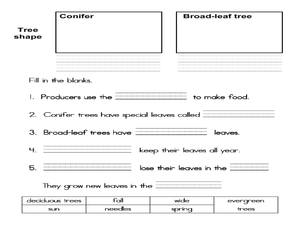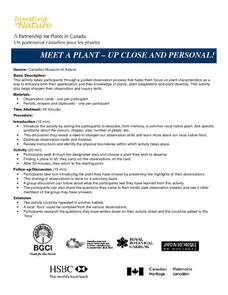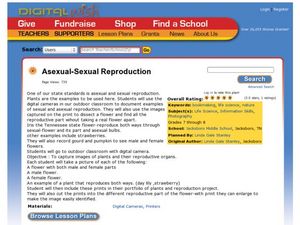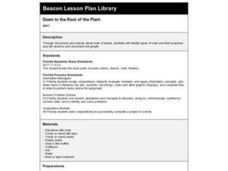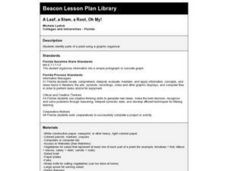Curated OER
Producers -- Focus on Trees
Students examine the needs of trees and plants. In this forest ecosystem lesson students use seedlings to investigate the basic necessities of plants. They discuss the consequences of these basic needs not being met.
Curated OER
MEET A PLANT - UP CLOSE AND PERSONAL!
Students sharpen their observation and inquiry skills. They participate in a guided observation process that helps them focus on plant characteristics as a way to enhance both their appreciation and their knowledge of plants, plant...
Curated OER
Hey - It's a Rainy Forest Out There!
Elementary schoolers take part in a very good lesson which has them watch video, conduct experiments, complete hands-on activities, and work in cooperative groups. The educationally-rich activities are clearly-explained, and the group...
Curated OER
Giant Smelly Plant Attracts Thousands
Read and discuss a news article about a rare corpse plant that bloomed in Washington D.C. Because this native Indonesian plant blooms so rarely, people flock to see it. After reading the article, your class answers comprehension...
Cal Recycle
Conserving Natural Resources
Trying to plan an engaging elementary science unit on natural resources? Conserve your energy! This five-part series of lessons and hands-on activities has exactly what you need to teach young scholars about the importance of conservation.
Georgia Department of Education
Living Things/ Nonliving Things
How can you tell if something is living or nonliving? Introduce a set of criteria which can be used to determine which things are alive and which are not. The class discusses the basic needs of all living organisms, checks out an...
Captain Planet Foundation
Energy Flow in the Garden
How can you tell what an owl has eaten? Study the food chain and flow of energy in an ecosystem by dissecting an owl pellet and noting the bones found inside. Additionally, the lesson includes a game about consumers and producers with a...
Curated OER
Cells, Cells, Cells
Students explore plant and animal cells. Using household items, students create a three-dimensional model of a plant or animal cell. Students identify and label each cell part.
Curated OER
Plant Pollination
Students investigate methods of pollination for various flowers. In this plant biology lesson plan, students learn the parts of a flower and form a hypothesis about the method of pollination for the flower. They determine the validity of...
Curated OER
Asexual-Sexual Reproduction
Eighth graders examine the reproductive organs of plants. In this plant reproduction instructional activity, 8th graders identify the reproductive organs of different plants using a digital camera. Students create a plant portfolio of...
Curated OER
Class Field Guide to the Sloughs
Students explore how to use field guides to identify wildlife. In this nature lesson students construct their own plant field guide.
Curated OER
No Title
First graders listen as the book, "Tops and Bottoms," by Janet Stevens is read to them and then participate in a discussion about foods and where they grow. They draw a picture of a plant labeling the major parts of it sequential order.
Exploring Nature Educational Resources
Building A Classroom Food Web
From bears and owls to chipmunks and trees, all life depends on the sun for the energy to survive. Young biologists develop an understanding of this big idea as they arrange this series of plant and animal picture cards into food webs...
Curated OER
From McGee's Farm to the Movies
Young scholars participate in several plant-themed activities. They keep a food log, identify any plants they have eaten and then classify these foods by the part of the plant that is edible. Students sing songs about plants, make...
Curated OER
From Seeds to Plants
Second graders review the process of plant reproduction and the role of seeds in that process. The students dissect a seed, analyze their finds, collect and record data, and make predictions about seed germination and plant growth.
Curated OER
Plants
Students identify and label parts of a plant. They will construct a plant from art material and describe the purpose of each part for the plants survival. Students author a book with pictures and words or a story about a plant.
Curated OER
Kool Kumara Lesson Plans
Students explore and observe the plant world and acquire knowledge about the functional parts of plants. For this Kool Kumara lesson, students make observations and record specific data on a recording sheet. Students estimation length,...
Curated OER
Prairie Find Outdoors
Students take a field trip to a local prairie. Using identification books, they identify various forbs and grasses in the prairie. As a class, they discuss the importance of forbs and grasses to the ecosystem and review the various types...
Curated OER
Making a Terrarium
Students become familiar with the materials needed to build a terrarium. In this terrarium lesson, students create a terrarium in a bottle and observe how it grows and takes care of itself.
Curated OER
A Tree-mendous Project
Seventh graders use their observation and measurement skills to identify trees. Using a tree diagram, they label the parts and discuss the functions of the tree. They practice using a dichotomous key to identify trees as well.
Curated OER
Plant Adaptations
Students identify parts of prairie plants. They sketch the plants indicating its adaptive parts and write brief descriptions of them. They present their findings to the class.
Curated OER
Down to the Root of the Plant
Second graders identify types of roots and their purposes and observe and document root growth. students observe their roots once a week and measure them to see if there has been any change. Each student keeps a written log of the...
Curated OER
The Seed Match
Young scholars study seeds and plants. In this science lesson, students explore seeds from various types of plants and complete a worksheet about seeds. Young scholars discuss plants that are fruits and vegetables and where they grow.
Curated OER
A Leaf, a Stem, a Root, Oh My!
Students conduct Internet research on plants and complete a WebQuest on vegetable plants. They use a graphic organizer to display their findings, observe actual vegetables and design a salad, noting which part of each plant is included.


